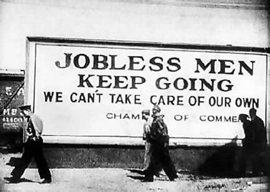
June 07, 2012

Part of my insouciance was due to having weightier things on my mind, such as how to get through the next round of chemo with my sanity intact. Another part was a sense of inevitability: My patience had been increasingly tested by the magazine’s neo-connery and racial timidity. A big part, though, was having been born when I was and decanted into the workforce when jobs grew in thick ripe bunches on low-hanging branches, just waiting to be picked. I have never felt the terror of joblessness.
When I finished college in 1967, there were jobs aplenty for everyone. For a college graduate in a STEM field (that’s science, technology, engineering, and math), the job market was a garden of delights. I changed employers a couple of times; then changed careers; then got restless and took off on my travels, living in countries where you could always pick up work teaching English. Back home, I got new jobs; then, bored with office routines, worked construction for a few months”good, bracing outdoor work, and not at all badly paid. Bliss was it in that dawn to be alive; to be an employee was very heaven.
It seems a long time ago. Now we are plainly sailing into an era when only a privileged class will have jobs. There is already no useful work (I am not counting government make-work) for anyone with an IQ below 90, and the cutoff point is creeping steadily northward.
The Internet has been a great job-killer. You’ll get a counterargument”the argument has been going on for some years”from netophiles such as this guy, but I don’t believe a word of it. I look at my 1911 Britannica and think of the hundreds of scholars”as well as printers, bookbinders, sales reps, distribution and advertising staff”who labored to produce it. Then I think of Wikipedia and the strange talpine subspecies responsible for its content. Who are not paid! It’s not a job!
Or I think of Facebook with its 900 million users and $16-billion initial market capitalization, but a mere 3,500 employees. That’s 257,000 users or $4.6 million per employee.
A couple more turns of the technological wheel, and companies with 23 employees will be servicing all seven billion souls on Earth at $1 billion per employee.
A great many middle-class jobs are teetering on the edge of extinction. Much lawyering, for example, is mechanizable”such as looking things up in those shelves of Morocco Bound Volumes you see behind the smiling partners in the firm’s brochures. This case we have here now: Wasn’t there a rather similar one a few years ago? What was it, 1987? 1988? How was it argued?
But that is just the kind of thing that data-mining and pattern-recognition software are very good at, and they”re getting better all the time. Convert those Morocco Bound Volumes to databases properly coded”a big task, but a one-off”throw in the software and some modest AI routines, and paralegals have gone the way of buggy-whip makers, along with not a few actual legals.
Oh, I know the thought of unemployed lawyers brings a serene smile to your face. But where lawyers lead, accountants, doctors, engineers, financial analysts, and college professors will be close behind.
All is not lost, though. In my previous Taki’s Mag column I mused on the strangely high proportion of beautiful young women behind the pharmacist’s counter. I got an answer from an actual pharmacist (male):
The nature of the profession I think attracts an inordinate amount of women. It’s easy to work part-time, because the job is a series of small transactions, with no long-term projects. The schooling commitment is much less than medical school, which appeals to the bright woman who wants to start a family. And for a high-paying job (salary is 80 percent of a family practitioner), the subject matter involved is neither technical nor math-intensive.
Like flying commercial planes, measuring out medications is one of those things where we want a visible human being in the loop, no matter how well technology might be able to do the job. If it’s a comely young lady, so much the better.
Planning a career or a career change? Consider pharmacy.